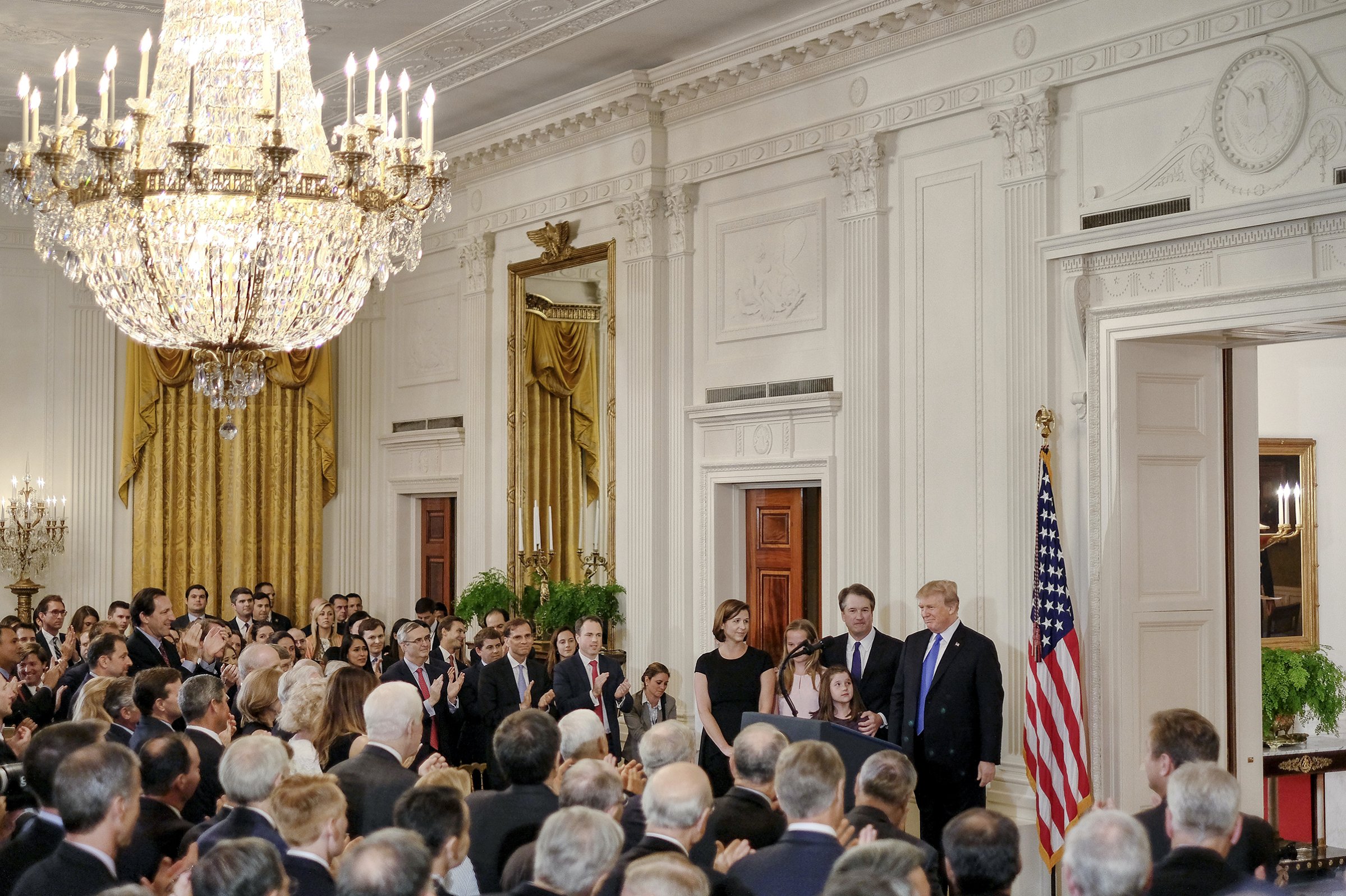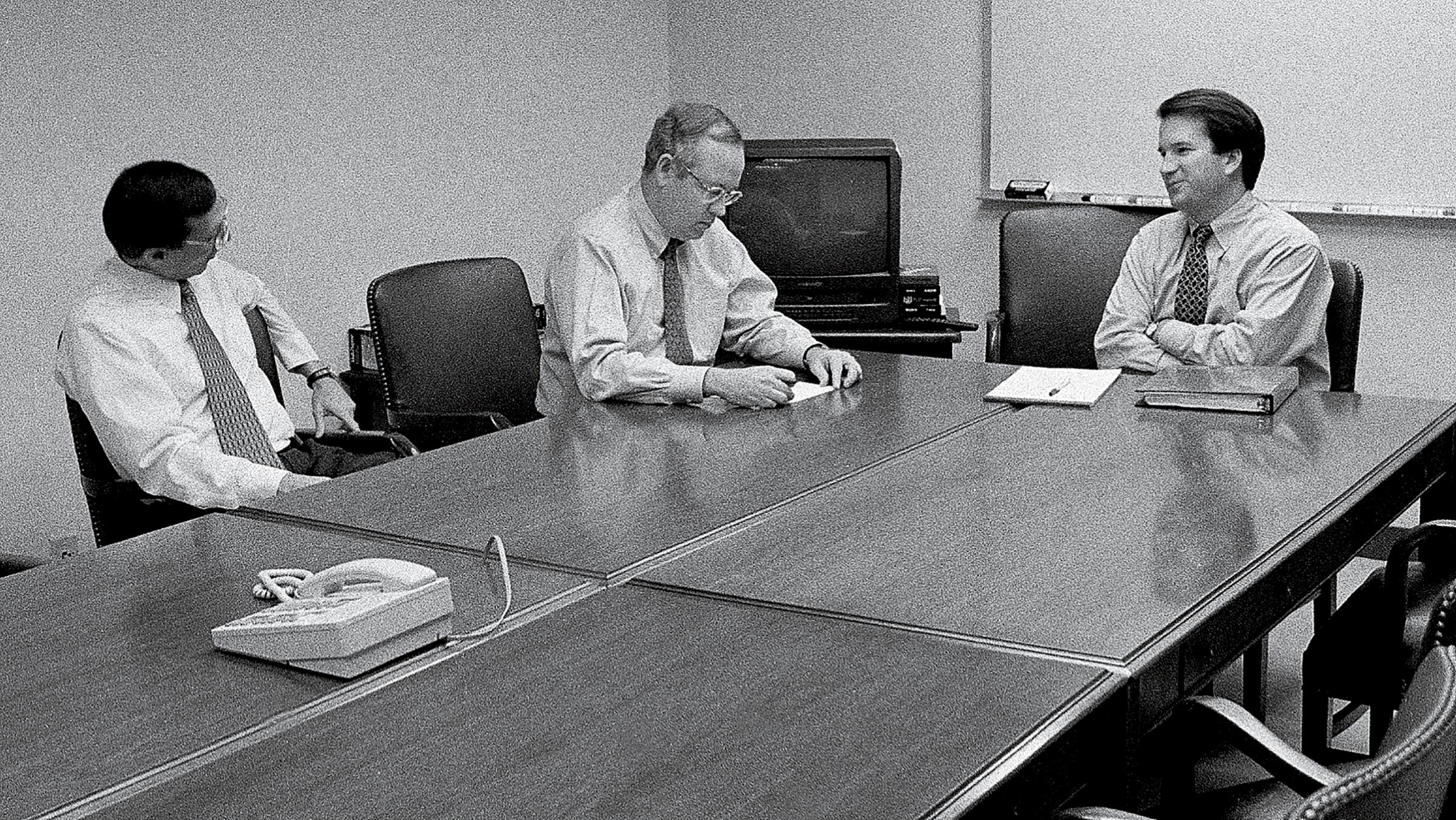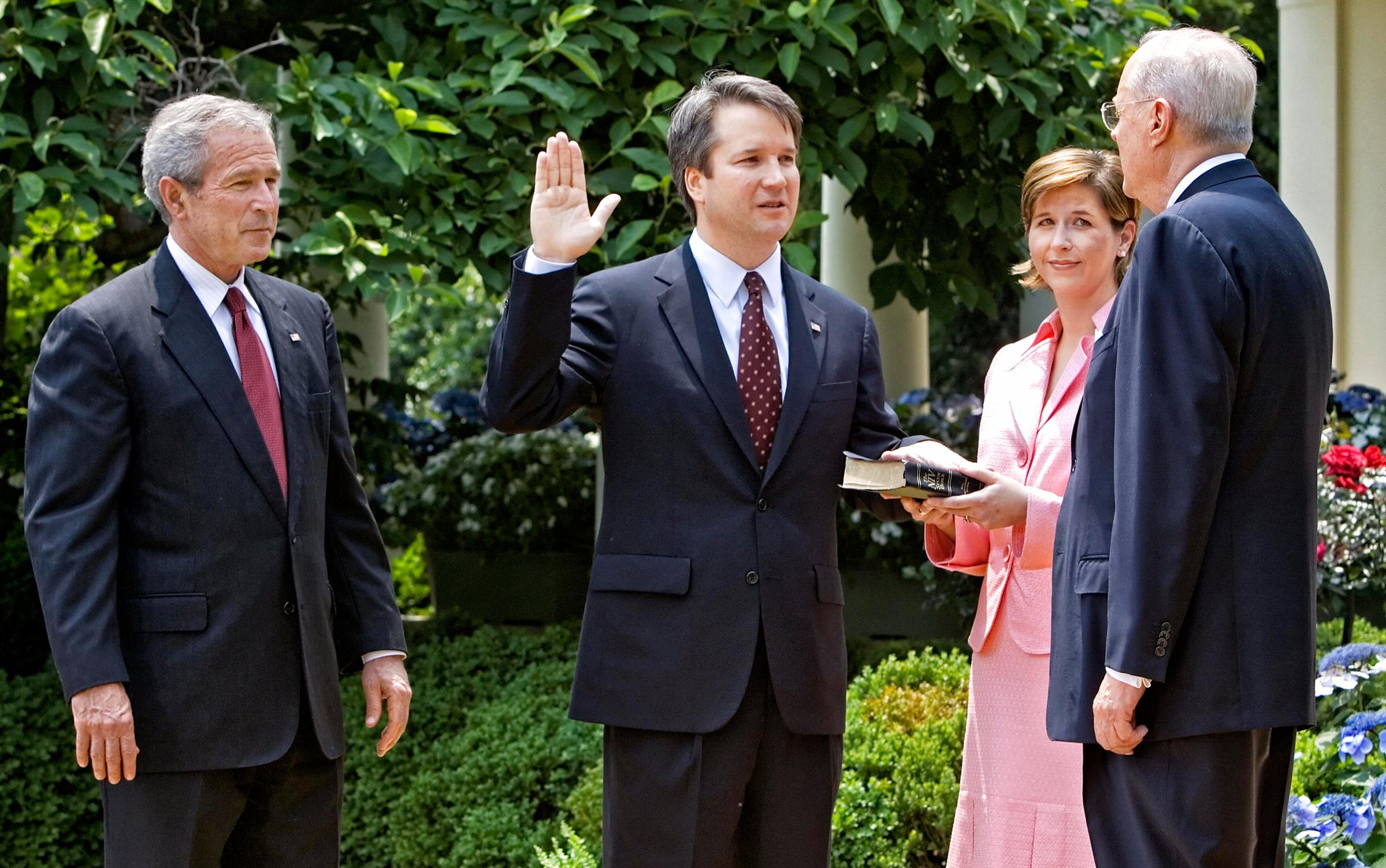
President Trump had narrowed his list of contenders for the nation’s highest court to four by the time Air Force One touched down outside Washington on July 8. But Trump wanted another sit-down with one candidate in particular. That evening at the White House, Trump spent more than an hour in his private residence talking with Brett Kavanaugh about the judge’s family, his life growing up in the capital with two lawyers as parents, and his work, according to a person familiar with the discussion. It was the longest amount of time Trump had spent with any of the candidates. After their discussion, Trump said Kavanaugh was a judge “out of central casting,” one of the President’s favorite compliments.
The meeting led directly to the East Room of the White House the following night where Trump announced Kavanaugh’s nomination beneath gleaming chandeliers. There, Kavanaugh needed only 14 words to describe his approach to the bench: “A judge must be independent and must interpret the law, not make the law.” That simple sentence was more than just a judicial philosophy. It reflected the culmination of two distinct efforts at judicial mentoring, which came together in Kavanaugh’s nomination. One was a four-decade effort by an entire generation of conservatives to bend the court away from judicial activism. The other was a patient education and corralling of Trump by a handful of Republican legal elites.
The intrigue surrounding the selection was, of course, classic Trump, from an interview process that resembled a matchmaking show to the pageantry of the prime-time announcement. But the choice will have far-reaching consequences for America’s 325 million citizens. If confirmed, Kavanaugh, 53, could solidify a conservative majority on the court for decades. During his 12 years on the U.S. Court of Appeals for the D.C. Circuit, he has issued some 300 opinions that reflect his reputation on both sides of the aisle as a solid and careful judge. Democrats warn that his conservative record suggests he will bolster the pro-business leaning on the court, advance efforts to strip power from regulatory agencies, slow the expansion of gay rights, strengthen gun rights and open the door for states to chip away at access to abortions.
No single Justice steers the Supreme Court. Kavanaugh’s influence will take years to measure and depends on which cases come before him. Protests from Democrats that Kavanaugh would help overturn the seminal abortion decision Roe v. Wade ignore the court’s deference to precedent. Kavanaugh himself said during his 2006 confirmation hearings for the lower court that Roe was already decided, although Supreme Court Justices can chart a new direction in ways lower courts cannot. But there is little question that his conservative jurisprudence would have a major impact, given Kavanaugh’s intellect, work ethic and reputation for clarity in his opinions. That body of writing persuaded Trump and his conservative advisers that Kavanaugh would remain a stalwart originalist on the bench.
Some observers wonder if Trump may have fixated on one point of view in particular. Kavanaugh, who was part of independent counsel Kenneth Starr’s investigation of President Bill Clinton and later served more than five years in President George W. Bush’s White House, is an ardent believer in executive power. In a 2009 law-review article, he called for Congress to pass a law stating that sitting Presidents should not be subject to criminal investigations or civil suits while in office, adding that the Constitution prescribes the impeachment process as the remedy for ousting a wayward President. That view has obvious implications for special counsel Robert Mueller’s investigation into Trump’s ties to Russia during the 2016 campaign. If the Justices are asked to decide whether Trump can be subpoenaed or charged with a crime in office, it’s clear where Kavanaugh is likely to stand.

Kavanaugh’s path to the East Room accelerated in November 2017, when his name was added to Trump’s public list of prospective Supreme Court nominees. The judges were vetted by Leonard Leo, executive vice president of the conservative Federalist Society and Trump’s top outside legal adviser. The arrangement was clear: Trump would cede considerable power to shape the court to the conservative legal establishment and in doing so cement his support from Republicans who were otherwise skeptical of a politician who once proclaimed his belief in abortion rights. Former White House strategist Stephen Bannon took to calling this transaction “the process.” And the selection of Kavanaugh, like conservative Justice Neil Gorsuch last year, “shows the process is working,” Bannon tells TIME.
Even more than Gorsuch–whose mother once ran the Environmental Protection Agency–Kavanaugh is a creature of Washington. He was born to two parents who brought their legal lessons to the family dinner table. Kavanaugh’s mother was one of D.C.’s few female prosecutors at the time and later became a judge; when Kavanaugh joined the bench more than a decade later, he hung a framed copy of her investiture documents on the wall next to his desk. Like Gorsuch, Kavanaugh attended Georgetown Preparatory School, a rigorous Jesuit school. He earned degrees from Yale College and Yale Law School, and clerked for Justice Anthony Kennedy alongside Gorsuch before joining Starr’s investigation into Clinton. Kavanaugh helped write the final Starr report, which recommended Clinton’s impeachment for lying about his sexual relationship with Monica Lewinsky.
When the presidential race between Al Gore and George W. Bush deadlocked in 2000, Kavanaugh joined the GOP legal team demanding an end to the Florida recount. Less than a year later, he was working inside the Bush White House, alongside his now wife Ashley, when jetliners struck the Twin Towers and the Pentagon on Sept. 11, 2001. (The two had had their first date the day before.) Kavanaugh served in the White House counsel’s office and as Bush’s staff secretary, a demanding job requiring meticulous close reading of every document that crosses the President’s desk. In 2003, Bush nominated Kavanaugh for the U.S. Court of Appeals for the D.C. Circuit, but Senate Democrats opposed him for a résumé that appeared too partisan. He was finally confirmed in a 57-36 vote in 2006.
On the court, Kavanaugh developed a reputation as a diligent judge who often combed through dozens of drafts for even routine opinions, says Roman Martinez, who clerked for Kavanaugh in 2008 and 2009 and recalls a boss who wanted memos and briefs to be accompanied by thick black binders filled with every law-review article on the topic. As opinions mounted, the binders stacked up in the kitchenette in Kavanaugh’s chambers. Kavanaugh is “one of the most serious judges I’ve ever encountered … He’s a much more disciplined judge than the man he’s replacing,” says Laurence Silberman, a senior judge on the D.C. circuit, echoing criticism of Kennedy’s sometimes unpredictable arguments.
Kavanaugh’s rulings reflect skepticism that government agencies have the power to issue regulations that stretch beyond what Congress has passed. He looked askance at several Obama-era environmental protections, including attempts to limit air pollution and greenhouse-gas emissions, and dissented in a 2015 decision upholding a regulation that required religious organizations to notify the government they were not providing or paying for contraceptives under the Affordable Care Act. Kavanaugh argued that filing the form would make the organization complicit and violate religious-freedom rights.
On gun rights, Kavanaugh has taken a broad reading of the Second Amendment, writing in a 2011 dissent that the District of Columbia should not be allowed to ban semiautomatic rifles and high-capacity magazines. Kavanaugh argued it was unconstitutional because similar weapons are commonly used in the U.S. As someone who grew up in Washington in the 1960s, ’70s and ’80s, “I am acutely aware of the gun, drug, and gang violence that has plagued all of us,” Kavanaugh wrote. “But our task is to apply the Constitution and the precedents of the Supreme Court, regardless of whether the result is one we agree with as a matter of first principles or policy.”

Concerns that Kavanaugh may help chip away at reproductive rights stem largely from a 2017 case in which an undocumented teenager at a Texas detention center sought an abortion after arriving in the U.S. eight weeks pregnant and was initially denied one due to the new policies of the Office of Refugee Resettlement, which prohibits them without the director’s approval. With the help of a guardian, the teenager challenged the policy as an unconstitutional burden. A lower court ruled in the teenager’s favor, which the government challenged. The D.C. circuit ultimately allowed the procedure to go forward, but Kavanaugh dissented, arguing that the majority had created “a new right for unlawful immigrant minors in U.S. government detention to obtain immediate abortion on demand.”
A number of cases related to abortion are moving through lower courts, and in the years to come the Supreme Court may decide to consider, for example, whether a woman can abort a fetus with an abnormality or where restrictions can be placed on a second-trimester abortion procedure. Leah Litman, an assistant professor of constitutional law at the University of California, Irvine, says Kavanaugh’s decision in the Texas case portends “a jurisprudence that will whittle away at access to abortion for women.”
That does not necessarily mean that Kavanaugh would help overturn Roe in the event that a case makes its way to the Supreme Court. During his 2006 confirmation hearings, Kavanaugh told Senators that Roe has “been reaffirmed many times” and he would “faithfully and fully” follow the decision. “That would be binding precedent of the court,” he said at the time. “It’s been decided.”
Legal scholars and politicos have also been scrutinizing Kavanaugh’s expansive interpretation of executive powers. Of all the judges Trump considered, “Kavanaugh has the most robust view of presidential powers and immunities,” says Jonathan Turley, a constitutional-law professor at George Washington University. Indeed, Kavanaugh’s 2009 Minnesota Law Review article seems to speak directly to the uncomfortable position in which Trump finds himself: a sitting President under investigation.
Kavanaugh said his experience working on Starr’s investigation convinced him that Presidents should have immunity from all civil and criminal investigations during their tenure. “I believe it vital that the President be able to focus on his never-ending tasks with as few distractions as possible,” he wrote. “The nation certainly would have been better off if President Clinton could have focused on Osama bin Laden without being distracted by the Paula Jones sexual harassment case and its criminal investigation offshoots.”
In the article, Kavanaugh acknowledges the Supreme Court’s 1997 ruling in Clinton v. Jones that the Constitution doesn’t give Presidents the opportunity to defer federal civil lawsuits during their tenure. But he urges Congress to fix the issue by passing a law allowing Presidents to delay civil and criminal investigations, including sit-downs with prosecutors, until they leave the White House. If something drastic happened, he argued, the impeachment process laid out in the Constitution would be sufficient. “The point is not to put the President above the law or to eliminate checks on the President,” he wrote, “but simply to defer litigation and investigations until the President is out of office.”
The article, written six years before Trump announced his bid for the White House, will likely now take center stage during confirmation hearings. The Mueller investigation could force the court to take up “a variety of legal questions about the special-counsel investigation and its relationship to presidential power,” says Richard Pildes, a constitutional law professor at New York University. Those range from a President’s ability to pardon himself to his constitutional authority to fire Mueller to whether Trump could be compelled to testify before a grand jury.
“Given how carefully potential nominees are vetted by the White House, it seems improbable that President Trump and his advisers aren’t aware of Kavanaugh’s views of presidential power,” says Tara Malloy, a senior director at the Campaign Legal Center. “There’s no doubt his perspective was taken into consideration.”
Kavanaugh’s long paper trail should reassure conservatives that he’s unlikely to veer left should the Senate approve his lifetime appointment. But it also comes with risks, providing fodder for Democrats’ campaign against him.
The battle to sink the nomination began even before Kavanaugh was put forth: Democratic Senator Bob Casey of Pennsylvania didn’t even wait to learn the nominee’s name before announcing that he was a no vote. The party is painting Kavanaugh as skeptical about abortion rights and health care access. “Pay close attention to this nomination,” Senator Kamala Harris of California warned on the steps of the Supreme Court. “If you are a young woman in America or you care about a young woman in America, pay attention to this, because it will forever change your life.” Nan Aron, president of the liberal Alliance for Justice, tells TIME that Kavanaugh’s nomination “sets in motion a hard-right turn for the country that may be irreversible in our lifetime.
Gearing up for a grinding battle, conservatives plan to pour millions of dollars into ad campaigns supporting Kavanaugh and pressuring Senate Democrats who are up for re-election in red states this year to confirm him. Already, the conservative Judicial Crisis Network has unleashed a $1.4 million ad campaign in the backyards of Alabama’s Doug Jones, Indiana’s Joe Donnelly, North Dakota’s Heidi Heitkamp and West Virginia’s Joe Manchin.
The White House has set up a war room on the fourth floor of the Eisenhower Executive Office Building near the West Wing with a bank of computers, a large flat-screen television blaring four news channels at once and a room that will be used for practice confirmation hearings. “Our strategy is to let him and his record speak for itself,” says White House spokesperson Raj Shah, who is running the press operations for the nomination.
There’s no guarantee that Democrats will hold together, especially if Kavanaugh appears heading to confirmation. Donnelly, Heitkamp and Manchin, each of whom face difficult re-election campaigns, all voted for Gorsuch. At the same time, fears among Republicans that GOP Senators Susan Collins of Maine or Lisa Murkowski of Alaska might defect over women’s-health issues (both support abortion rights) seemed to fade after Kavanaugh’s rollout.
Which leaves the question of what kind of Justice Kavanaugh might be. Some Justices have stood out for talking, others by staying silent, a few by corralling others to join their opinions. Kavanaugh seems likeliest to change the court through his dogged conservatism, shaped by his belief that the founders intended for Congress to write the laws, the executive branch to execute them and judges to draw a bright line between the two.
–With reporting by TESSA BERENSON, PHILIP ELLIOTT, ABIGAIL SIMON and ABBY VESOULIS/WASHINGTON and ALANA ABRAMSON/NEW YORK
More Must-Reads from TIME
- Cybersecurity Experts Are Sounding the Alarm on DOGE
- Meet the 2025 Women of the Year
- The Harsh Truth About Disability Inclusion
- Why Do More Young Adults Have Cancer?
- Colman Domingo Leads With Radical Love
- How to Get Better at Doing Things Alone
- Michelle Zauner Stares Down the Darkness
Contact us at letters@time.com